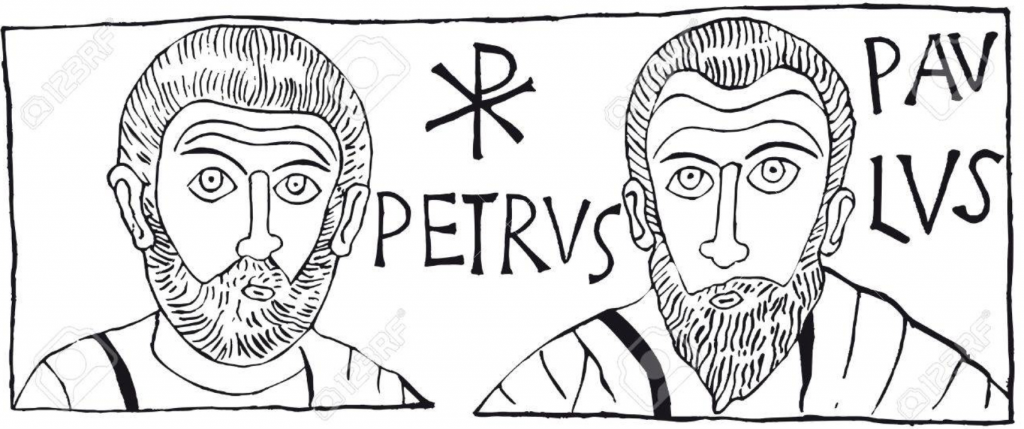Feast Day of SS Peter & Paul – 29 June
Saint Peter
Simon Peter was one of the Twelve Apostles of Jesus and the first bishop of Rome. Peter is featured prominently in the New Testament Gospels and the Acts of the Apostles and is venerated as a saint and the first Pope. The son of John, he was from the village of Bethsaida in the province of Galilee. His brother Andrew was also an apostle.
Peter was one of twelve apostles chosen by Jesus from his first disciples. Originally a fisherman, he was assigned a leadership role and was with Jesus during events witnessed by only a few apostles, such as the Transfiguration. According to the Gospels, he confessed Jesus as the Messiah, was part of Jesus’ inner circle, walked on water, denied Jesus and preached on the day of Pentecost.
According to Christian tradition, Peter is said to have been crucified in Rome under Emperor Nero Augustus Caesar. It is traditionally held that he was crucified upside down at his own request, since he saw himself unworthy to be crucified in the same way as Jesus Christ. Catholic tradition holds that Saint Peter’s site of crucifixion is located in the Clementine Chapel, while his mortal bones and remains are contained in the underground Confessio of St. Peter’s Basilica, where Pope Paul VI announced the excavated discovery of a first-century Roman cemetery in 1968. Every June 29 since 1736, a statue of Saint Peter has been crowned in St. Peter’s Basilica with a papal tiara, ring of the fisherman and papal vestments, as part of the Feast of Saints Peter and Paul.
St Paul
Paul the Apostle, original known as Saul of Tarsus, was an apostle who took the gospel of Christ to the first-century world. He is generally considered one of the most important figures of the Apostolic Age. In the mid-30s to the mid-50s, he founded several churches in Asia Minor and Europe. Paul used his status as both a Jew and a Roman citizen to advantage in his ministry to both Jewish and Roman audiences.
A native of Tarsus, the capital city in the Roman province of Cilicia, Paul wrote that he was “a Hebrew born of Hebrews”, a Pharisee, and one who advanced in Judaism beyond many of his peers. He zealously persecuted the early followers of Jesus of Nazareth and violently tried to destroy the newly forming Christian church. Paul’s dramatic conversion on the road to Damascus radically changed the course of his life.
After his conversion, Paul began to preach that Jesus is the Christ, the Son of God. His leadership, influence, and legacy led to the formation of communities dominated by Gentile groups that worshiped Jesus, adhered to the “Judaic moral code”, but relaxed or abandoned the ritual and dietary teachings of the Law of Moses. He taught that these laws and rituals had either been fulfilled in the life of Christ or were symbolic precursors of Christ, though the exact relationship between Paul the Apostle and Judaism is still disputed. Paul taught of the life and works of Jesus Christ and his teaching of a new testament, established through Jesus’ death and resurrection.
Thirteen of the twenty-seven books in the New Testament (Romans through Philemon) have been attributed to Paul, and approximately half of the Acts of the Apostles deals with Paul’s life and works. However, only seven of the epistles are undisputed by scholars as being authentic, with varying degrees of argument about the remainder. The authorship of Hebrews has the most doubt cast against it. Even in the second century there was doubt in some regions that Paul was the author and since the Protestant Reformation, most scholars have not believed it to have been written by Paul. The other six are believed by some scholars to have come from followers writing in his name, using material from Paul’s surviving letters and letters written by him that no longer survive. More conservative scholars argue that the idea of a pseudonymous author for the disputed epistles itself raises many problems.
Today, his epistles continue to be deeply rooted in the theology, worship, and pastoral life in the Roman and Protestant traditions of the West, as well as the Orthodox traditions of the East. Among the many other apostles and missionaries involved in the spread of the Christian faith, his influence on Christian thought and practice has been characterized as being as “profound as it is pervasive”. Augustine of Hippo developed Paul’s idea that salvation is based on faith and not “works of the law”.
